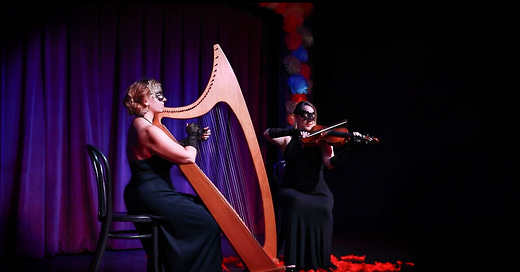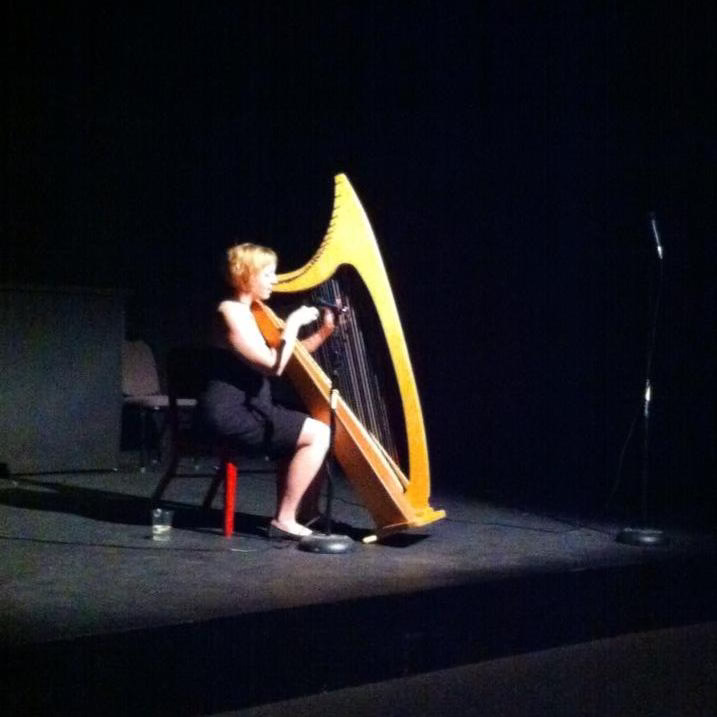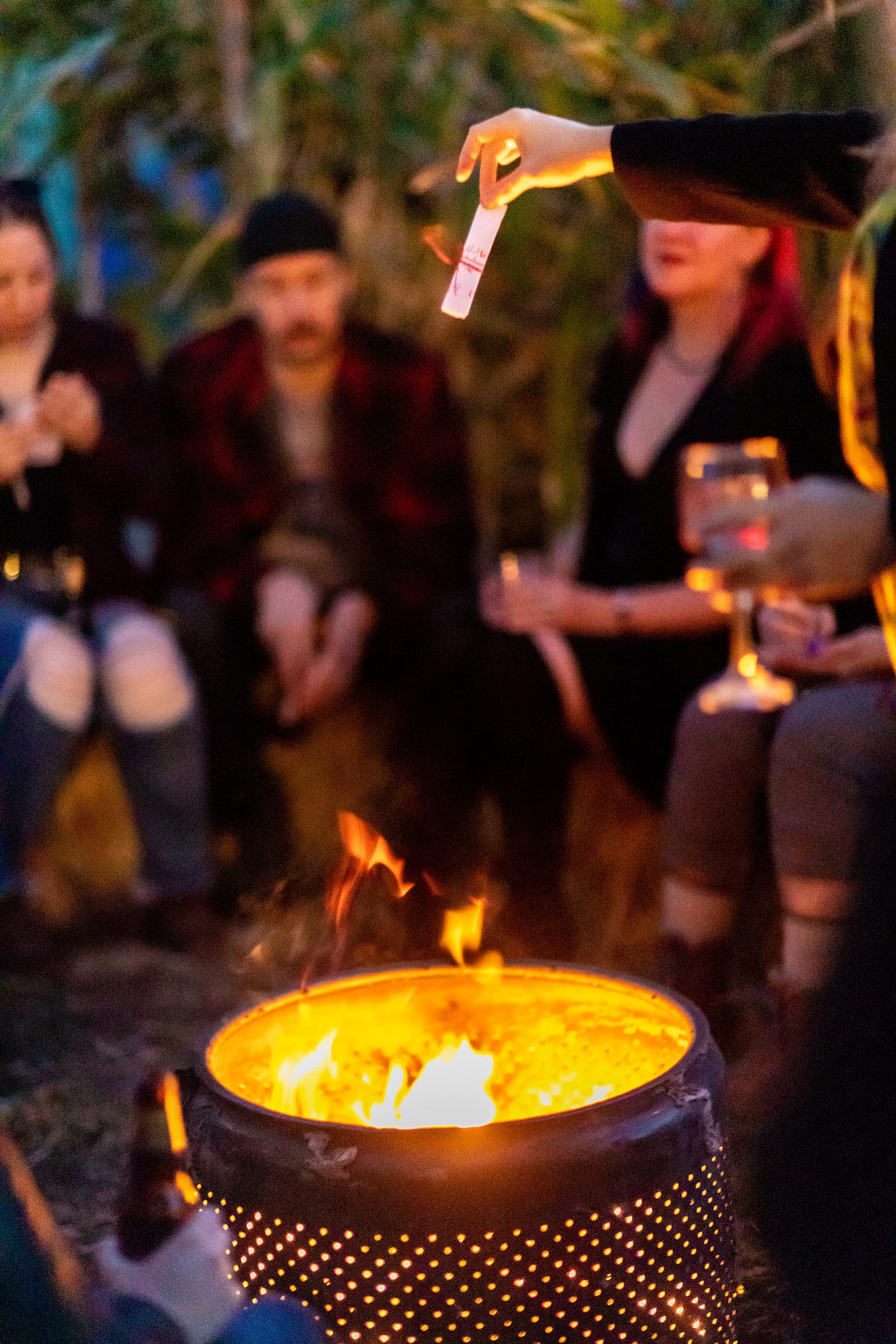Dear Michael Fenlason,
Everyone is going to read this. Don’t make faces. It’s fine.
There was a time when making a music video would have seemed like it was outside of my scope. Isn’t that something people in rock bands do? I certainly didn’t know anything about how to do it. As usual, I didn’t have any money to do it. But mostly, it never occurred to me that I could do it. I was so wrapped up in this idea of being some kind of modern-day bard, uncertain whether or not I could even pull it off. I never thought far enough down the line to envision this moment.
I remember all those years ago, sitting at Elliott’s on Congress at 10 in the morning, drinking ginger vodka and soda, trying to get up the nerve to go across the street to St. Cecilia Studios and record my first EP. Vaulted Heart Box was my first official attempt at capturing this work. That EP was paid for by three people: My father, you, and me.
I was terrified. Luckily, I’ve been way more terrified a number of times since then. Growth is a good thing. None of it would have happened though, if you hadn’t told me in no uncertain terms that I HAD to make that recording. If you hadn’t written that check, sitting in that same booth at Elliott’s. You were always at that same booth at Elliott’s. We all jokingly called it your office. And in many ways, it was, especially in the STRADA days.
I would have never thought about making a music video. But then you died. I must tell you that to this day, I’ve never been that drunk in my entire life, Michael’s Irish Wake. Dear god, we must have all been drinking for 12 hours straight, or maybe it just felt like 12? Telling stories, laughing, crying, filling in the blanks of the lost years since we had all shared that booth at Elliott’s together.
All your lost boys and girls. Now permanently ejected from Neverland and forced back into the world. To die, it turns out, was your next awfully big adventure.
The first time I had the idea to make the video, I went to Nicole. It seemed like the natural thing to do. We were in the play together, and I thought it would give us both an outlet for our grief and gratitude. But it didn’t work out. Grief can really do a number on any of us. Our friendship didn’t survive the attempt. She once said we would be friends until we weren’t. It seemed ominously prophetic when she said it, and it was. Years passed after that, and the idea sat.
Sometimes, I would think about that ridiculous score you let me write for your equally ridiculous Maccers interpretation, MacBeth’s Knife. The play that shall not be named but set in a Brothel in Bagdad during the Iraq War. That’s what I remember of it, anyway. I remember thinking that the actress with the cocaine had clearly never actually done cocaine. I still have the script sitting in my email. Somehow, it wasn’t nearly as awful as it sounded when you pitched it. Even what seemed like your most outlandish ideas always had this satire about them that made them work. We all channel a bit of who we are into everything we do.
Some of the tracks from the show have since been lost, but some have miraculously escaped the ravages of time and digital file management. I didn’t know anything about how to write music for a play back then. Your lack of direction, boundaries, expectations, or deadlines was supremely frustrating. It forced me to be clear about my vision and how to execute it. Despite having no experience. Which I eventually forgave you for. You simply put your complete trust in me. That I would do it, do it well, and do it on time, and considered the matter closed. It was one of the most jarring experiences. Whether or not it was the first time someone had truly trusted me with my own artistic vision or not, it sure felt like it.
If it hadn’t been for the time I spent knocking about at the Beowulf Alley Theatre, I would never have gotten the Arizona Theatre Company job. The theater has periodically played an important role in my life, but those years were formative. You taught me how to write my first grant. I was asked to book music for events at ATC. This helped me understand something many of the musicians I worked with didn’t understand: how hard it is for venues to make live music pay for itself in the modern age. More importantly, these spaces gave me places to perform my music, which allowed me to grow my vision. This project that people later told me wasn’t marketable or that I would never get into real performance spaces. In the theater world, it seemed completely natural and wonderful to everyone. I felt like I was starting to understand what community meant for the first time.
Beowulf Alley Theatre
What was the name of that play you wrote about the death of the misunderstood artist? I don’t remember. I do remember going with Nicole to see the reading of it at the ATC Lounge while I was working there. We were drinking Malbec. It’s funny that I can remember what we were drinking but not the name of the play. The other thing I remember from that night was the feeling of purpose that play instilled in me. It felt like permission to go out into the world and create the art I wanted to create even if no one understood it, and I never made any money from it. This was one of your core beliefs. One that you instilled in all of us. That our art mattered.
When you asked me to write a song for your play Time Gentlemen Please, I was more confident than I had been in the Beowulf years. I had the music for one play under my belt and more experience writing music in general. This time, instead of prerecording tracks, I would perform live on stage as part of the play for the Tucson Fringe Festival. It felt like an arrival for me. The life of an artist is the journey of a lifetime of arrivals. As a harpist, I’ve been asked to be an angel before, but no one ever asked me to be a drunker, ruder Clarance in a nihilistic dismemberment of It’s a Wonderful Life. I couldn’t pass it up.
Once I read the script, it felt like the song wrote itself. I still have that script as well. When I reread it recently, it felt like a vehicle into a simpler time. When we were all so enamored with art that we dared to be honest about it. To tell truths about human nature with dirty jokes and drunk snarky angels, without worrying about igniting a cultural war. Perhaps for me, it encapsulates an innocence we have now lost. The world is a vastly different place than when you left it. And sometimes I envy you for that. That you never had to know what we’ve all been living through.
Mariah enters. Starts playing the harp
during Josh’s last monologue.
JOSH
Thank you, people of Earth, you’ve been a great crowd. If you take out the Holocaust.
Thank you so much. Good night.
MARIAH
Well?
JOSH
I think I’ll live.
MARIAH
If you only had one hour to live, what would you do?
JOSH
I’d probably hit you with that harp.
MARIAH
Good luck with that.
JOSH
No. I’d find her. I’d find her and tell her I love her.
MARIAH
Just keep turning over the hourglass.
From the back of house, we hear Michael.
MICHAEL
Time, Gentlemen, please
When Nicci Radhe approached me about shooting a music video I knew exactly what I wanted to do. It was my second chance to give life to a video for Old Sins.
I set out intending to recreate that time and space, at Beowulf and with STRADA Company. As a tribute to the influence you had on so many lives. I rented the theater at Live Theatre Workshop to film the stage shots. I wanted to follow actors around at rehearsals. To film shots capturing something of the post-opening-night bar culture that is so specific to the theater world. But my attempts to get those shots kept thwarting me. The fates have their ways of keeping us on task in this life.
I sat down to have a chat with myself about the direction of my vision, and there you were. Self-effacing as ever, insisting that it isn’t about you. That I needed to abandon that idea. You were right. It isn’t about either of us. That’s one of the best no-bullshit lessons of the Greek theater. It’s not about you and me; it’s about the power of story. These are mearly parts that we play as we pass through this life. Theater, at its core, exists to help us remember this truth. As a way to see ourselves in the mirror as individuals. So that we might grow and change and heal. As a way to see the culture, we all contribute to creating. So that we might escape being the authors of our own demise.
Instead of attempting to recreate the past, I endevoured to step into my present. My vision became a communication to you about what I had learned about Greek ritual, theater, and culture since you left the stage.
How the cult of Medea was connected to the birth of modern medicine through snakes and their venom. But also to the tradition of prophecy and the keeping of stories. Everything I had learned, and more importantly experienced about the cult of Dionysus, which, let’s be real, we were already clearly devotees of. Its importance in the origins of theater and how that seems to have built debauchery and dismemberment into the cake. Looking at acts of immersive theater through the eyes of ancient peoples who saw them as rituals to ensure that the world kept spinning. The threads that wove these traditions back through time to the ancient Paleolithic Bird Godesses. And forwards into the Virgin Mary with her foot on the Serpent. I knew you’d be nuts about all of it. “You keep bees now? How cool is that?” This is what my mind tells me you would say.
Instead of making it about you or some futile attempt to recreate the past, I made it about letting go. I tried to speak to the tools I have learned for confronting loss. The tools we have for releasing our fears and past hurts to move forward into our lives with more grace. I tried to capture the root essence of what theater was intended to be: a ritual for confronting the shadows within ourselves. A ritual communicated through three modes of delivery: tragedy, comedy, and of course your favorite satire.
If I’m being honest, there isn’t a lot of traditional theater in my life these days. I still attend a show here or there. But I have stepped into spaces that feel like they’re deeply connected to the original intentions of the Greeks, and I have been so grateful for that. Shows with dance and poetry and ritual and purpose. I produced my first pole dancing ballet. You would have loved it.
You are no longer here to listen to my theories about theater as medicine. You’re not here to share in any of the things I have learned or to see any of the things I have done with the chances you gave me. Everything we grow in the arts sprouts from the seed of that first person to believe in your vision. Thank you for your belief in my vision.
I have no one to do Shakespearean Sonnetomancy with anymore. Let’s try it. Pick a number between 1 and 154. 79 you say? Ok, 79.
Whilst I alone did call upon thy aid,
My verse alone had all thy gentle grace;
But now my gracious numbers are decayed,
And my sick muse doth give another place.
I grant, sweet love, thy lovely argument
Deserves the travail of a worthier pen;
Yet what of thee thy poet doth invent
He robs thee of and pays it thee again.
He lends thee virtue, and he stole that word
From thy behavior; beauty doth he give
And found it in thy cheek. He can afford
No praise to thee but what in thee doth live.
Then thank him not for that which he doth say,
Since what he owes thee thou thyself dost pay.
When we are dead and gone, we, as artists, can no longer serve our muses. But the muses live on. Their stories and inspirations whisper into the ears of others that take our place. This is how art has been passed from generation to generation since the first conceptions of craft entered human consciousness. It will continue to do so as long as humans remain human, maybe even longer. This is a beautiful legacy. One that I am so honored you taught me how to hold with responsibility. With the knowledge that to make art is to participate in something much greater than yourself. To make good art is to be aware of it.





